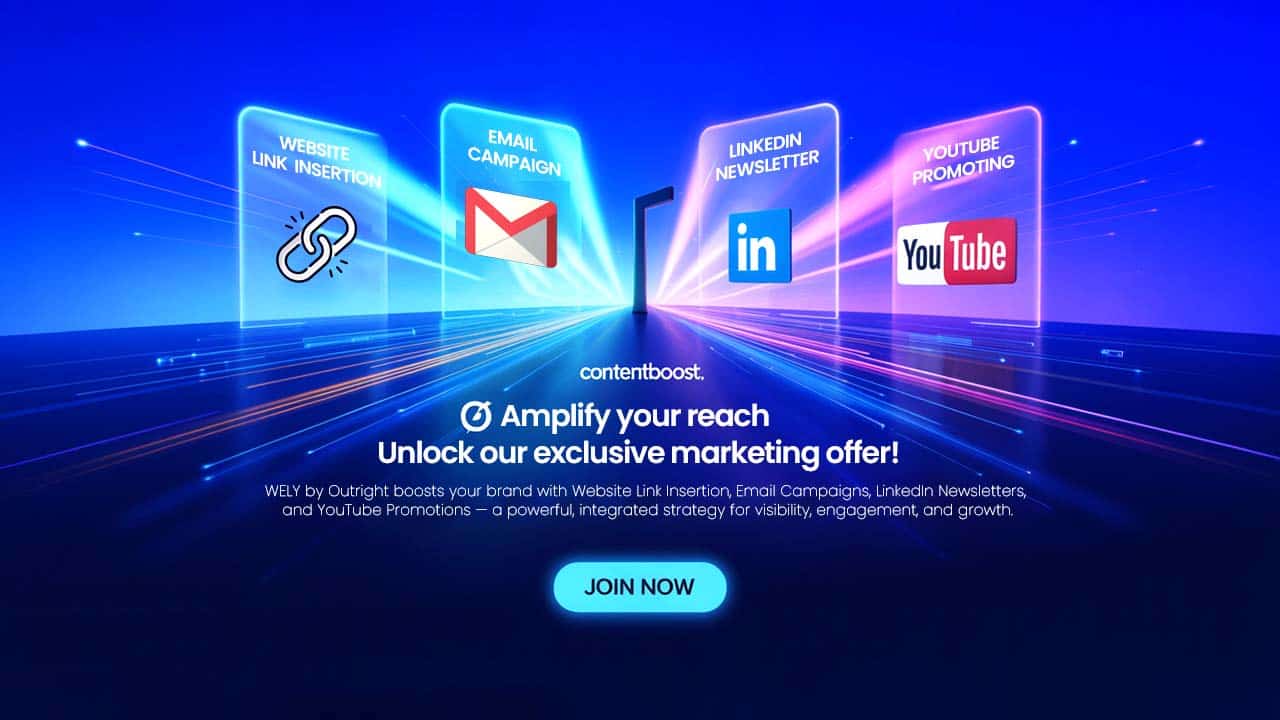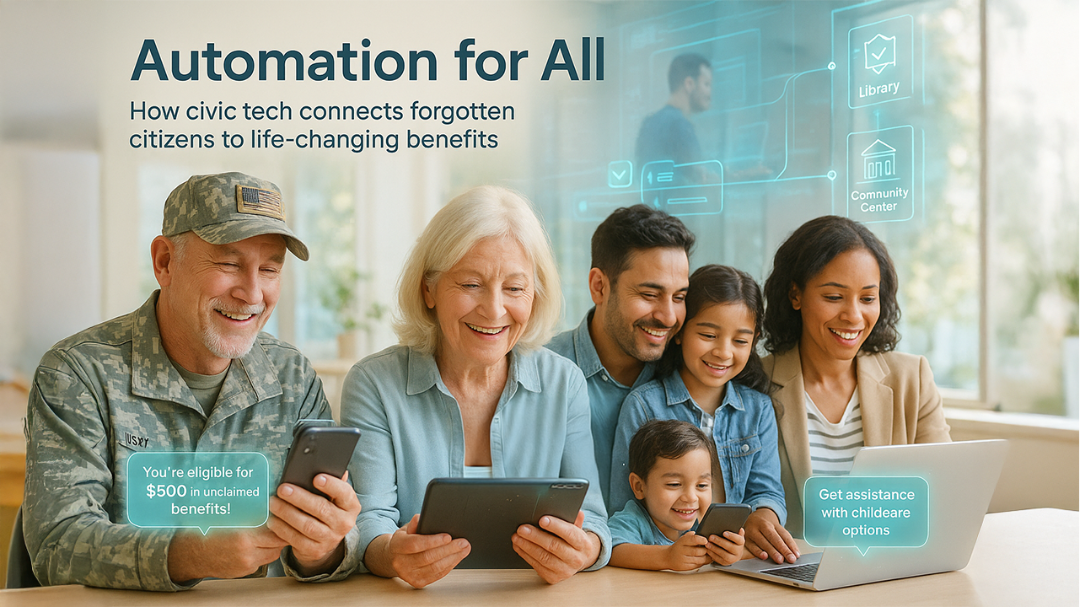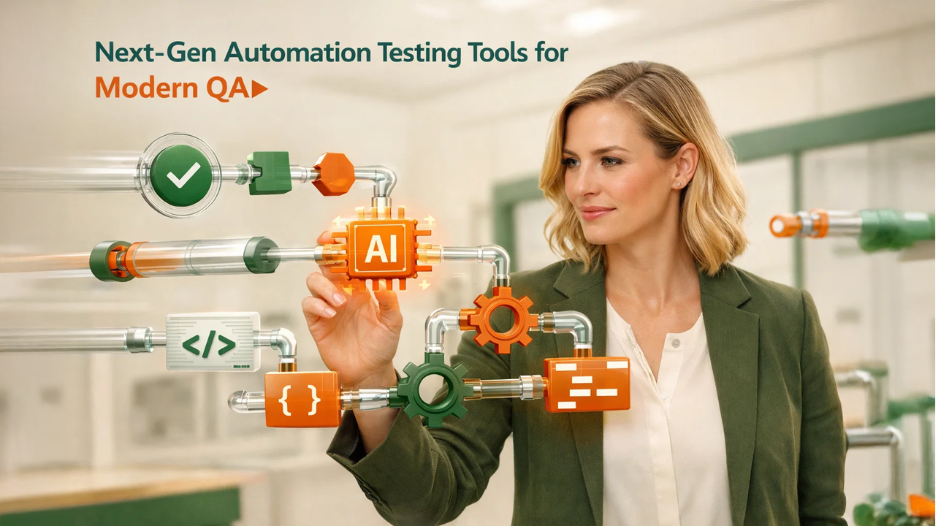The Civic Tech Marketing Paradox Civic tech platforms are meant to support people who cannot afford it the most: veterans, low-income families, seniors, and immigrants, but these groups do not
The Civic Tech Marketing Paradox
Civic tech platforms are meant to support people who cannot afford it the most: veterans, low-income families, seniors, and immigrants, but these groups do not normally experience traditional marketing. Millions miss out on $68 billion in unclaimed assets because they don’t search online, distrust institutions, or lack digital access. Successful civic engagement needs to flip the logic of marketing, finding and activating unaware citizens with automated, empathetic communication. Solutions such as ClaimNotify apply smart marketing automation to fill this gap, linking underserved segments to assets that were previously inaccessible behind bureaucracy and technical hurdles.
Understanding Your Underserved Audience
Segmentation Beyond Demographics
Typical marketing divides people by age, income, or device usage. Civic tech requires deeper segmentation based on awareness, trust, access, and urgency. Who knows that unclaimed property exists? Who only has a mobile phone? Who mistrusts official messages? Successful automation takes into account the literacy level, communication channels of choice, and cultural sensitivities. Segmentation at this point isn't for selling; it's for inclusion.
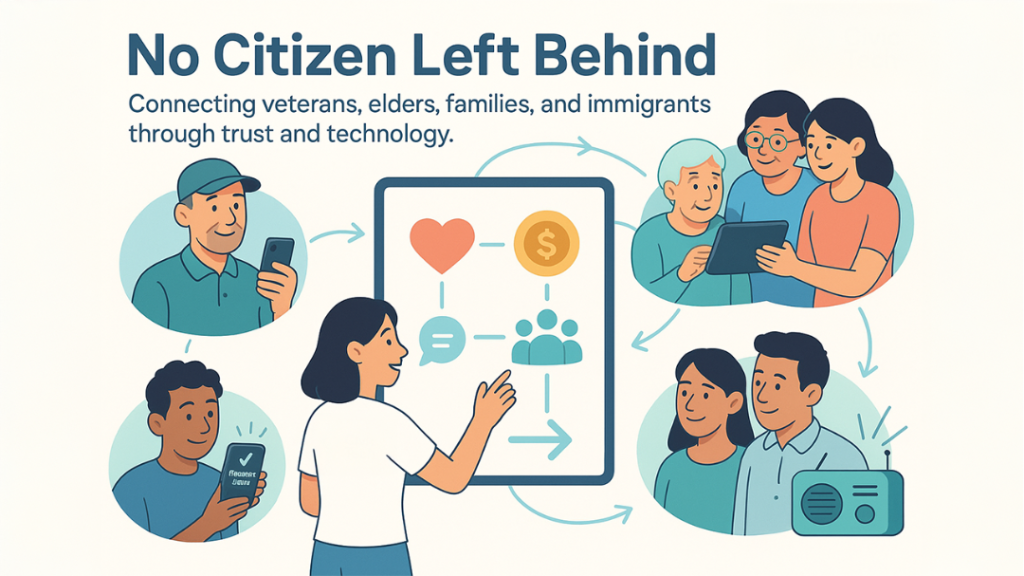
The constant changes in location and complicated VA paperwork can frequently make veterans forget about their benefits, and many lack trust in official outreach because of the past. Nevertheless, peer-to-peer referral is potent due to strong bonds within the community. Skepticism can be addressed through campaigns with long-time testimonials, with trustworthy partner organizations.
Older Populations
Older people might possess resources from years ago but little computer literacy and intense fears regarding scams. They are more receptive to trusted voices, local groups, relatives, or household name media such as radio and print. The messaging should focus on legitimacy, safety, and assistance possibilities with the combination of digital and offline follow-up in most cases.
Low-Income Families
These citizens need the funds most urgently but face the highest access barriers. Most people are dependent on prepaid phones that have a fixed data cap and have to work many jobs with no time to experiment with services. The messages have to be brief, mobile, and result-oriented: they should be about the money recovered, rather than the features.
Immigrant Communities
Language and trust are the main barriers here. Immigrants may fear government contact or misunderstand the purpose of “unclaimed property.” Culturally relevant translation and partnerships with local community centers, churches, or ethnic media build credibility. WhatsApp communities and local radio stations can surpass sponsored online advertisements.
People Who've Moved Around Often
For residents who've moved addresses often, missing assets abound. Automated contact that links records between states and incites mobile validation is essential. Integrating postal-change APIs and mobile notifications ensures they stay informed regardless of location.
Research Methods
These audiences can only be understood by listening but not by guessing. Tone and format preferences can be found with the help of community interviews, focus groups, and multilingual surveys. Accessibility testing is used to test the usability of individuals with disabilities or low literacy. Partnerships with advocacy groups extend reach into real communities instead of abstract “segments.”
Email Marketing Automation
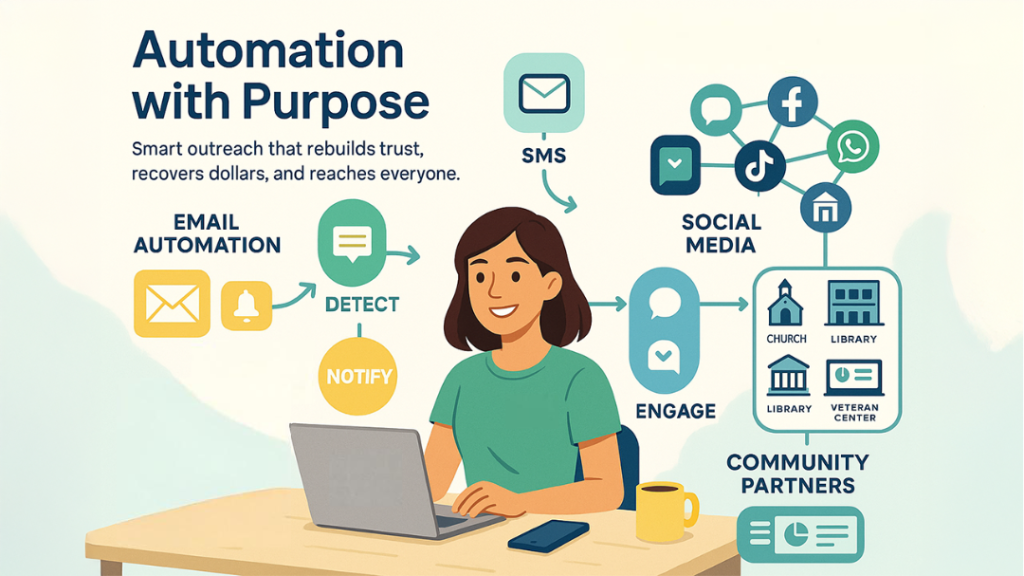
Email is worth something when it's tailored. Automation can create on-time, relevant reminders:
- When new unclaimed property is found, alert probable matches.
- When a user begins but fails to complete a claim, send a useful reminder.
- Following a successful claim, ask for a testimonial or suggest checking for relatives.
Segmentation guarantees a tone and message appropriate for the recipient: Veterans receive messages highlighting service acknowledgment; older persons receive plain, fraud-deceptive descriptions; and Spanish-language recipients are delivered native-language content.
SMS/Text Automation
SMS is essential to underserved users. It is internet-free, works across all phones, and has a 98% open rate. Automation can verify claims, provide document reminders, or inform users of deposits. Messages need to be under 160 characters, written simply, and arrive during polite times. SMS also inspires trust by being immediate; users get real-time updates rather than waiting for an email.
Social Media Automation
Each platform reaches a unique slice of the audience.
- Facebook: Discusses old, lower-income, and local users.
- Instagram: Visual storytelling for younger cohorts.
- TikTok: Awareness for people who have never heard of unclaimed property.
- Nextdoor: Hyperlocal trusted networks.
- WhatsApp: Particular importance for immigrant outreach.
Pre-scheduled tweets, auto-responses, and sentiment tracking keep the communities active without overloading small civic groups. Testimonials, infographics, and brief multilingual videos display real outcomes, and acknowledgment is attained with time.
Partnership Marketing Automation
Community organizations already have trusted relationships. It is their reach that is magnified by automation, in terms of co-branded toolkits, templates, flyers and posts that can be shared. The number of individuals assisted by each partner can be tracked using dashboards and make outreach measurable social impact. Churches, libraries, and veterans' centers are turned into distributed marketing machines fueled by data.
Enabling advanced automation allows platforms such as ClaimNotify to reach underserved groups at scale, notifying veterans of unclaimed military benefits through targeted emails, delivering SMS reminders to low-income families, and empowering hundreds of local organizations with automated content. Every campaign gauges achievement not in clicks, but in dollars recovered and trust restored.
Measuring What Matters
Beyond Vanity Metrics
Traditional marketing celebrates follower counts, email opens, or page views. Civic tech must look deeper. The goal isn’t engagement for engagement’s sake; it’s helping people reclaim resources that improve their lives.
Real Impact Metrics
Monitor searches from underserved populations, claims filed and settled, value collected, and cost per dollar collected. Gauge trust: repeat visits, word of mouth, and language mix of users. See which channels are driving the most validated claims, not merely traffic.
Segment-Specific KPIs
- Veterans: Percent of searches from .mil domains, successful benefit claims, and peer referrals.
- Elderly: Assisted vs. self-service completions, family involvement.
- Low-Income: Average recovered amount, geographic spread across disadvantaged zip codes.
- Immigrants: Non-English usage rates, partner referrals, translation feedback.
The most meaningful metric isn’t ROI in the corporate sense; it’s social ROI: homes saved, medical bills paid, education funded, and economic stimulus from money returned to local economies.
Automation Serving Social Good
Effective civic tech automation is empathy at scale, understanding underserved communities and meeting them through trusted channels. Technology should personalize impact, not just amplify reach. Trust is the true metric; every message builds or breaks it. The automation of platforms such as ClaimNotify is a demonstration of how social good can be served through outreach that is both inclusive, transparent, and data-driven. At its most positive, automation links individuals to opportunities they had never heard of, and algorithms have become instruments of justice to ensure no citizen is unknown and underserved.
Conclusion
Marketing automation in civic technology is not just about tech—it's about people. With intelligent, empathetic communication, tools like ClaimNotify assist in reaching those too often left behind, enabling them more easily to receive the help and funds they're entitled to, and making a tangible difference in their lives.
Respond to this article with emojis
